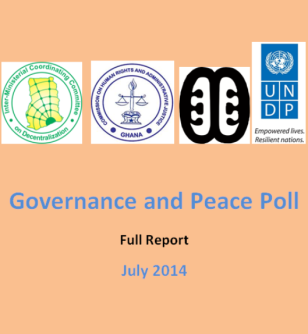Governance and Peace Poll Report - July 2014
Governance and Peace Poll Report - July 2014
July 30, 2014
The Governance & Peace Poll (GaP Poll) is a mechanism for the United Nations Development Programme (UNDP) and its lead partners to track the extent to which progress is being made in the areas of governance and peace as they relate to approved work plans under the United Nations Development Assistance Framework.
This survey was conducted in June 2014. The methodology involves the creation of a list of respondents who have agreed to be contacted regularly on matters relating to governance and peace. These respondents were randomly selected using criteria of gender and region. The poll is nationally representative, and has a margin of error of +/- 3%, at a 95% confidence interval.
Highlights
- Level of Trust in Public Institutions: More than half of the respondents indicated they trust the Electoral Commission (57%), National Peace Council (64%), Law Courts (53%) and CHRAJ (60%) to deliver on their mandate. However, 53% do not trust District Assemblies to deliver on their mandate.
- Contact with Duty Bearers: Most of the respondents said they do not contact duty bearers [Members of Parliament (84%), district assembly officials (79%), Unit Committee member (75%) and Assembly representative (68%)] to share their views on pertinent development issues.
- Trust in the prosecutorial powers of the state: Even though 53% of the respondents trust the law courts, only 47% said they trust in the ability of the state to prosecute cases in the law courts. A significant 45% did not trust the state at all or trusted them a little to prosecute cases.
- Willingness of Women to Accept Leadership Position: In a country with few women in leadership position, it is encouraging to note that 54% of women respondents were willing to accept a leadership role in a political party if offered them. While an overwhelming majority of women in Upper West (85%) region were more willing to accept a leadership role in a political party only 47% of women in the Eastern region were willing to do so.
- 73% of the women interviewed said they were willing to accept a leadership role in a private sector organization, with the rate particularly high in the Northern region (91%). Moreover, 70% of the women respondents indicated that they were willing to accept leadership role in a public sector organisation.
- Payment of Bribe: A significant majority (80%) of respondents who reported having contacted a service provider in the past 12 months said they did not pay a bribe.

 Locations
Locations